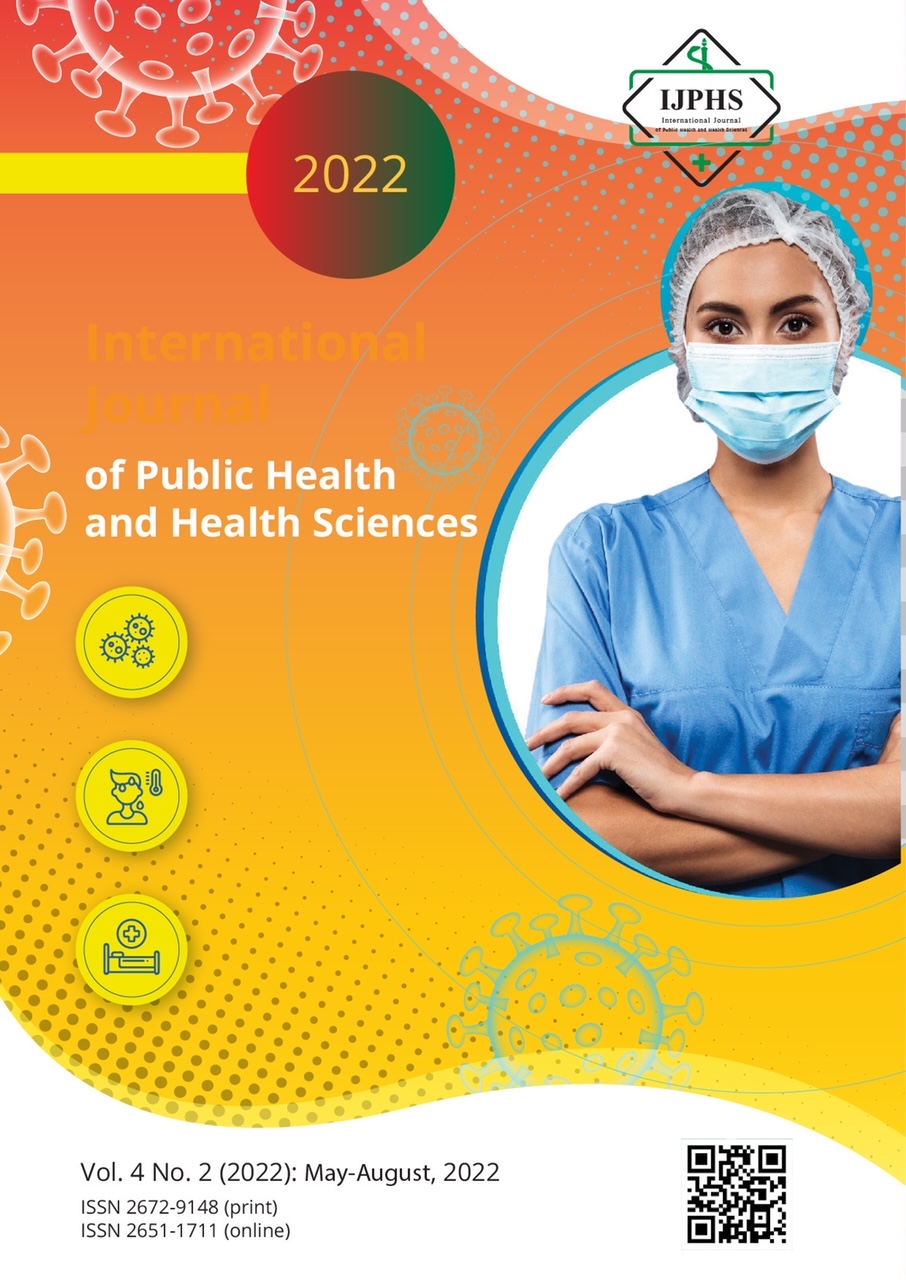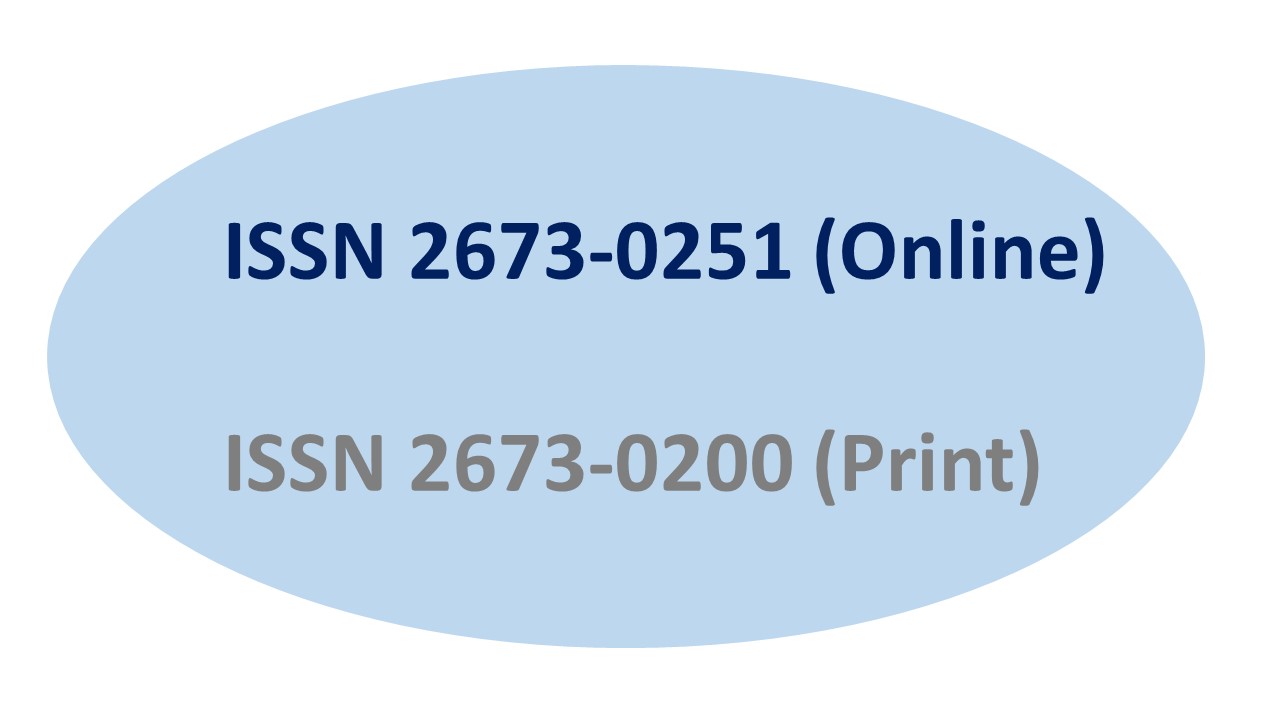Caregivers of Older Adults with Chronic Illnesses and Coping Strategies and Quality of Life: A Convergent Mixed Methods Study
Keywords:
Caregivers, Mixed-method designs, Quality of life, Coping strategies, Older adultsAbstract
Objectives: This study aims to develop a comprehensive understanding of coping strategies, quality of life (QoL), and its associated factors among caregivers of older adults with chronic illnesses. Methods: A convergent mixed methods approach was used. This study was conducted in a tertiary level hospital in Chanthaburi province, which is located in the eastern region of Thailand from February 1 to July 31, 2021. In total, 57 patient-caregiver dyads completed the Thai version of coping, and adaptation processing scale-short form (TCAPS-SF) to assess their coping strategies and the World Health Organization Quality of Life Assessment in Thai (WHOQOL-BREF-Thai) to assess their quality of life were measured. A sample of 57 caregivers participated in semi-structured face-to-face interviews. Data were analyzed using qualitative content analysis and correlation analysis. Results: The caregivers' mean age was over 40 years. Correlation analysis showed that the coping strategies had a moderate association with quality of life (QoL) (r = 0.344, p <0.01). From qualitative findings, threatening coping factors (including avoidance state and alcohol drinking) and four enhancing coping factors (including community as assistance, self-encouraging activity, religious commitment, and positive perspective) were generated. The mixed analysis confirmed that coping strategies are associated with QoL. Conclusions: Caregivers of older adults with chronic conditions experience caregiving challenges resulting from their coping strategies that impact caregivers' QoL. Collaborative efforts are needed to create multifaceted interventions and programs to enhance caregivers' coping strategies as transitional care from hospital to home.
References
Abbey, A., Smith, M. J., & Scott, R. O. (1993). The relationship between reasons for drinking alcohol and alcohol consumption: an interactional approach. Addictive behaviors, 18(6), 659–670. https://doi.org/10.1016/0306-4603(93)90019-6
Amankwaa, B. (2017). Informal caregiver stress. ABNF journal, 28(4), 92-95.
Anjos, K. F. D., Boery, R. N. S. D. O., Pereira, R., Pedreira, L. C., Vilela, A. B. A., Santos, V. C., & Rosa, D. D. O. S. (2015). Association between social support and quality of life of relative caregivers of elderly dependents. Ciencia & saude coletiva, 20, 1321-1330.
Cheng, H. Y., Chair, S. Y., & Chau, J. P. C. (2018). Effectiveness of a strength-oriented psychoeducation on caregiving competence, problem-solving abilities, psychosocial outcomes and physical health among family caregiver of stroke survivors: A randomised controlled trial. International Journal of Nursing Studies, 87, 84-93. doi: 10.1016/j.ijnurstu.2018.07.005.
Couto, A. M. D., Caldas, C. P., & Castro, E. A. B. D. (2018). Family caregiver of older adults and Cultural Care in Nursing care. Revista brasileira de enfermagem, 71(3), 959-966. https://doi.org/10.1590/0034-7167-2017-0105.
Creswell, J. W., & Plano Clark, V. L. (2018). Designing review. Nursing Science Quarterly, 33(4), 330-338. https://doi.org/10.1016/j.jagp.2018.12.003.
del‐Pino‐Casado, R., Frías‐Osuna, A., Palomino‐Moral, P. A., & Pancorbo‐Hidalgo, P. L. (2011). Coping and subjective burden in caregivers of older relatives: a quantitative systematic review. Journal of advanced nursing, 67(11), 2311-2322. doi:10.1111/j.1365-2648.2011.05725.x
Dickson, V. V., & Page, S.D. (2021). Using mixed methods in cardiovascular nursing research; Answering the why, the how, and the what's next. European Journal of Cardiovascular Nursing , 20(1), 82-89. https://doi.org/10.1177/1474515117693890
Durante, A., Ahtisham, Y., Cuoco, A., Boyne, J., Brawner, B., Juarez‐Vela, R., & Vellone, E. (2022). Informal caregivers of people with heart failure and resilience: A convergent mixed methods study. Journal of Advanced Nursing, 78(1), 264-275.
Faronbi, J. O., & Fajemilehin, B. R. (2012). Management of osteo-arthritic pain by the elderly in Niger. Africa Journal of Nursing and Midwifery, 14(1), 28-37.
Faronbi, J. O., Faronbi, G. O., Ayamolowo, S. J., & Olaogun, A. A. (2019). Caring for the seniors with chronic illness: The lived experience of caregivers of older adults. Archives of gerontology and geriatrics, 82, 8-14. https://doi.org/10.1016/j.archger.2019.01.013
Graven, L. J., Glueckauf, R. L., Regal, R. A., Merbitz, N. K., Lustria, M., & James, B. A. (2021). Telehealth Interventions for Family Caregivers of Persons with Chronic Health Conditions: A Systematic Review of Randomized Controlled Trials. International journal of telemedicine and applications, 2021, 3518050. https://doi.org/10.1155/2021/3518050
Hesamzadeh, A., Dalvandi, A., Maddah, S. B., Khoshknab, M. F., & Ahmadi, F. (2015). Family adaptation to stroke: A metasynthesis of qualitative research based on double ABCX model. Asian Nursing Research, 9(3), 177-184. http://dx.doi. org/10.1016/j.anr.2015.03.005.
Hirakawa, Y., Kuzuya, M., Enoki, H., & Uemura, K. (2011). Information needs and sources of family caregivers of home elderly patients. Archives of gerontology and geriatrics, 52(2), 202-205. doi:10.1016/j.archger.2010.03.019
Hsiao, H. C., Chao, H. C., & Wang, J. J. (2013). Features of problematic eating behaviors among community-dwelling older adults with dementia: Family caregivers' experience. Geriatric Nursing, 34(5), 361-365. http://dx.doi.org/10.1016/j.gerinurse.2013.06.010
Kameda, N., Hattori, A., Nishinaga, M., Tuchimochi, H., Nakahara, K., Oouchi, A., ... & Orimo, H. (2001). Quantitative evaluation of the burden of those giving home care for senile dementia of Alzheimer type subjects using the burnout scale of pines. Nihon Ronen Igakkai zasshi. Japanese journal of geriatrics, 38(3), 382-387. DOI: 10.3143/geriatrics.38.382
King, R. B., Ainsworth, C. R., Ronen, M., & Hartke, R. J. (2010). Stroke caregivers: pressing problems reported during the first months of caregiving. The Journal of neuroscience nursing : journal of the American Association of Neuroscience Nurses, 42(6), 302–311. https://doi.org/10.1097/jnn.0b013e3181f8a575
Koerner, S. S., Shirai, Y., & Pedroza, R. (2013). Role of religious/spiritual beliefs and practices among Latino family caregivers of Mexican descent. Journal of Latina/o Psychology, 1(2), 95. doi:10.1037/a0032438
Kuluski, K., Gill, A., Naganathan, G., Upshur, R., Jaakkimainen, R. L., & Wodchis, W. P. (2013). A qualitative descriptive study on the alignment of care goals between older persons with multi-morbidities, their family physicians and informal caregivers. BMC Family Practice, 14(1),1-10. doi: 10.1186/1471-2296-14-133
Kumar, R., Kaur, S., & Reddemma, K. (2015). Needs, burden, coping and quality of life in stroke caregivers a pilot survey. Nursing and midwifery research journal, 11(2), 57-67.
Ilse, I. B., Feys, H., De Wit, L., Putman, K., & De Weerdt, W. (2008). Stroke caregivers' strain: prevalence and determinants in the first six months after stroke. Disability and Rehabilitation, 30(7), 523-530.
Imaiso, J., & Yamauchi, T. (2009). Caregiver suctioning education for Japanese patients with an invasive home ventilator. Nursing & health sciences, 11(4), 422-429. doi:10.1111/j.1442-2018.2009.00469.x
Lai, D. W. L. (2012). Effect of Financial Costs on Caregiving Burden of Family Caregivers of Older Adults. SAGE Open, 2(4). doi:10.1177/2158244012470467
Lutz, B. J., & Young, M. E. (2010). Rethinking intervention strategies in stroke family caregiving. Rehabilitation Nursing, 35(4), 152-160. https://doi.org/10.1002/j.2048-7940.2010.tb00041.x
Marying, P. (2014). Qualitative content analysis: theoretical foundation basic procedure and software solution. Sage. https://nbn-resolving.org/urn:nbn:de:0168-ssoar-395173
Matovu, S. N., & Wallhagen, M. I. (2020). Perceived caregiver stress, coping, and quality of life of older Ugandan grandparent-caregivers. Journal of cross-cultural gerontology, 35(3), 311-328.
Moorman, S. M., & Macdonald, C. (2013). Medically complex home care and caregiver strain. The Gerontologist, 53(3), 407-417.https://doi.org/10.1093/geront/gns067
Moos R.H., Brennan P.L., Fondacaro M.R. & Moos B.S. (1990b) Approach and avoidance coping responses among older problem and nonproblem drinkers. Psychology and Aging 5(1), 31–40.
Muriel, R., Gillick, M. D., Ave, B., & Floor, S. (2013). The Critical Role of Caregivers in Achieving Patient-Centered Care. JAMA, 310(6), 575–576. doi:10.1001/jama.2013.7310
Nagi, M., Kapoor, S., Kaur, S., & Gupta, S. K. (2013). Development of Skill in Suctioning Technique among Caregivers of Patients. Research & Reviews: A Journal of Neuroscience, 3(3), 5-13.
Rodakowski, J., Skidmore, E. R., Rogers, J. C., & Schulz, R. (2012). Role of social support in predicting caregiver burden. Archives of physical medicine and rehabilitation, 93(12), 2229-2236.doi:10.1016/j.apmr.2012.07.004
Rodríguez-Pérez, M., Abreu-Sánchez, A., Rojas-Ocaña, M. J., & Del-Pino-Casado, R. (2017). Coping strategies and quality of life in caregivers of dependent elderly relatives. Health and quality of life outcomes, 15(1), 71. https://doi.org/10.1186/s12955-017-0634-8
Roy, C. (2008). The Roy adaptation model. (3 rd ed). Upper Saddle River, NJ: Pearson.
Saunders, B., Sim, J., Kingstome, T., Baker, S., Waterfield, J., Bartlam, B., Burroughs, H., & Jinks, C. (2018). Saturation in qualitative research: exploring its conceptualization and operationalization. Quality & Quantity, 52(4), 1893-1907. https://doi.org/10.1007/s11135-017-0574-8
Susanti, H., Wardani, I. Y., & Fitriani, N. (2019). Family experience in providing support and the achieving of post-stroke late adulthood development. Enfermeria clinica, 29, 900-904. https://doi.org/10.1016/j.enfcli.2019.04.137
Tay, K. C. P., Seow, C. C. D., Xiao, C., Lee, H. M. J., Chiu, H. F., & Chan, S. W. C. (2016). Structured interviews examining the burden, coping, self-efficacy, and quality of life among family caregivers of persons with dementia in Singapore. Dementia, 15(2), 204-220
United Nations, Department of Economic and Social Affairs, Population Division (2017). World Population Ageing 2017 - Highlights (ST/ESA/SER.A/397).
Vaingankar, J. A., Chong, S. A., Abdin, E., Picco, L., Jeyagurunathan, A., Zhang, Y., ... & Subramaniam, M. (2016). Care participation and burden among informal caregivers of older adults with care needs and associations with dementia. International psychogeriatrics, 28(2), 221-231. doi:10.1017/S104161021500160X
Xie, H., Cheng, C., Tao, Y., Zhang, J., Robert, D., Jia, J., & Su, Y. (2016). Quality of life in Chinese family caregivers for elderly people with chronic diseases. Health and quality of life outcomes, 14(1), 1-9.
Yarkın, O., Tamer, S., Gamze, O., Irem, M., & Huseyin, B. (2009). Effect of surgery on psychiatric states and quality of life of paraplegics and quadriplegics with pressure sores and their primary caregivers. European journal of plastic surgery, 32(4), 173-176. doi 10.1007/s00238-009-0333-8
Yuan, Q., Wang, P., Tan, T. H., Devi, F., Poremski, D., Magadi, H., Goveas, R., Ng, L. L., Chong, S. A., & Subramaniam, M. (2021). Coping Patterns Among Primary Informal Dementia Caregivers in Singapore and Its Impact on Caregivers-Implications of a Latent Class Analysis. The Gerontologist, 61(5), 680–692. https://doi.org/10.1093/geront/gnaa080
Zhong, Y., Wang, J., & Nicholas, S. (2020). Social support and depressive symptoms among family caregivers of older people with disabilities in four provinces of urban China: the mediating role of caregiver burden. BMC geriatrics, 20(1), 1-10. doi.org/10.1186/s12877-019-1403-9
Downloads
Published
Issue
Section
License
Copyright (c) 2022 International Journal of Public Health and Health Sciences

This work is licensed under a Creative Commons Attribution-NonCommercial-NoDerivatives 4.0 International License.
If the manuscript is accepted for publication, copyright of the article shall be assigned to the IJPHS. After acceptance of a manuscript, the authors will be requested to complete a copyright transfer agreement form







